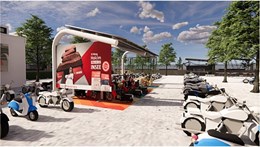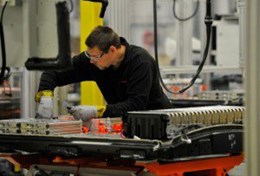-

The Ministry of Trade, Industry and Energy of Korea has fully launched an energy efficiency rating system for electric vehicles, categorizing 278 models into five levels.
-

New research from the American Council for an Energy-Efficient Economy (ACEEE) finds that making average electric vehicles as efficient as their higher-performing peers can reduce the upfront cost of an EV by almost $5,000 and cut charging costs by nearly a third. Improving the efficiency of a 300-mile-range EV can give it the same range with much smaller batteries, significantly cutting costs.
-

Nguyen Thi Thuy Van and her sister, Khuong Vu Tram Anh, majoring in Architecture, Ho Chi Minh City University of Technology, have just completed the project of a charging station for electric vehicles using solar energy named Greensol.
-

The latest from Nissan: their new generation batteries for electric vehicles will be made in the UK.
-

The government is investing £40 million in projects which boost the use of electric vehicles.
-

Demand for plug-in and electric vehicles (EVs) is rising, according to new data.
-

The streets of Paris will be fitted with 90 new charging points for electric vehicles (EVs) as part of Renault-Nissan Alliance's pledge to transport delegates around the city during the upcoming UN climate talks.
-

The MOSFETs can bring highestenergy efficiency to end-applications such as power and gardening tools, light electric vehicles, drones and e-bikes that demand a high level of energy efficiency but are restricted in available space.
-

Scotland has launched its largest all-electric car club at the University of St Andrews.A fleet of 10 Renault electric vehicles are available, with businesses, residents and visitors able to hire them by the hour from three different locations
-

Scientists at the Centre for Solar Energy and Hydrogen Research Baden-Württemberg, ZSW (Germany) have developed top-class lithium-ion batteries.
-

The US Department of Energy (DOE) and its National Renewable Energy Laboratories (NREL, Golden, Colorado, US) will open a new facility dedicated to utility-scale integration of technology including solar photovoltaics (PV), wind turbines and electric vehicles on August 21st, 2013.
-

Electric vehicles (EVs) are becoming increasingly popular, as people and cities all over the world have started recognizing their advantages and introducing initiatives to promote the use of the plug-in transport option.
-

Costs of manufacture of batteries and power trains of electric vehicles can be halved by 2018, if the gaps in the innovation chain can be closed. For reaching this objective, KIT scientists develop concrete, close-to-industry solutions for energy stores and power trains and combine them on the system level.
-

U.S. Energy Secretary Steven Chu Tuesday announced $5 million in new funding for community efforts to deploy electric vehicle infrastructure and charging stations. The funding opportunity furthers President Barack Obama's stated goals of putting one million electric drive vehicles on the road in the United States by 2015 and reducing U.S. oil imports by one-third by 2025.
-

American consumers don’t want things forced on them by the government, but they are slowly starting to become aware of energy issues via the rising cost of energy and the geo-political climate, said Crane. “Everyone in this room has a vested interest in electric vehicles becoming successful,” said Crane to the room largely made up by investors, and the future is “all about electric vehicles.”
-

Scientists are reporting development of an advanced lithium-ion battery that is ideal for powering the electric vehicles now making their way into dealer showrooms. The new battery can store large amounts of energy in a small space and has a high rate capacity, meaning it can provide current even in extreme temperatures.
-

India was taking serious steps to promote alternative technologies that used bio-fuels and solar and wind energy, a senior official said Saturday. India also has plans to produce more bio-fuels and electric vehicles to save petrol for other vital needs, Sohail Akhtar, director in the ministry of new and renewable energy, said.
-

Nissan showed a two-seater electric vehicle resembling a go-cart Monday that isn’t ready for sale but spotlights the Japanese automaker’s ambitions to be the leader in zero-emission cars. Nissan is planning to produce 250,000 electric vehicles a year, starting with the Leaf electric car set for delivery in Japan and the U.S. in December, and next year in Europe.
-

The Coca-Cola company has been introducing more electric vehicles and other low-emissions trucks into its massive fleet, and now researchers at the Hong Kong Polytechnic University are developing yet another alternative energy option. The team has been working on a solar powered air conditioning system that would significantly reduce or eliminate beverage delivery truck emissions related to cooling.
-

One of the first 100 percent electric mass-production cars in US is to be launched this year and will be for sale starting 2011. The CODA Sedan will be manufactured by a private American firm that sells battery systems and all-electric vehicles.




















 Consultation on the methodology for developing and updating energy consumption standards for four major industrial sectors
Consultation on the methodology for developing and updating energy consumption standards for four major industrial sectors
 Opening of the 2025 Energy-Efficient Equipment and Green Transition Exhibition Fair
Opening of the 2025 Energy-Efficient Equipment and Green Transition Exhibition Fair
 Energy-saving solutions and green transition promotion
Energy-saving solutions and green transition promotion
 The 9th VEPG Steering Committee Meeting: Strengthening Coordination for Viet Nam’s Just Energy Transition
The 9th VEPG Steering Committee Meeting: Strengthening Coordination for Viet Nam’s Just Energy Transition